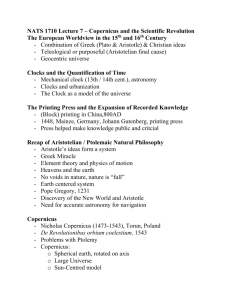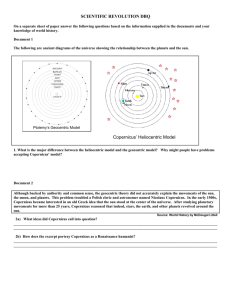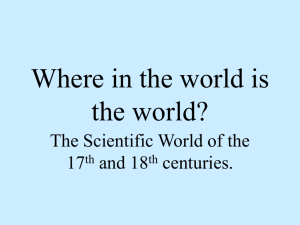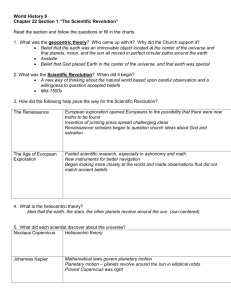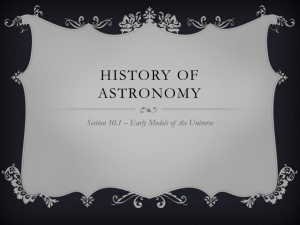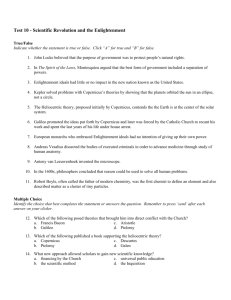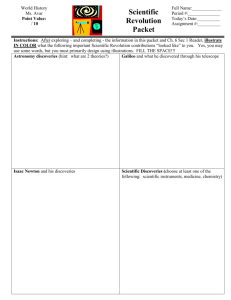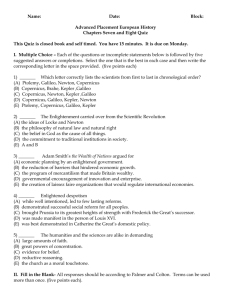Copernicus' Proof of the Earth's motion 3 International Conference on Absolutes
advertisement
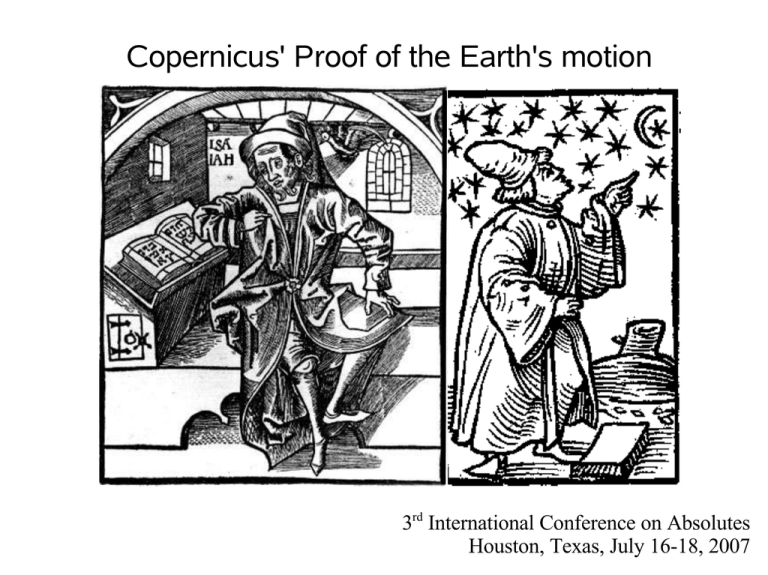
Copernicus' Proof of the Earth's motion
3rd International Conference on Absolutes
Houston, Texas, July 16-18, 2007
Actual Scientific Research Model
The following shows the actual scientific investigation model including the
publication of scientific papers is also controlled by this model.
Modify
Measurements
Evidence
Press Agentry
NPR, PBS
Chomsky's
Manufacturing
Consent
Hypothesis
Prediction
and/or Experiment
Filter Results
Built on Principles
Occam's Razor
Terrestrial laws equal Celestial laws
Falsify
Paper
accepted
for
publication
Built on Mathematics
Money
Curve fitting
Built on Proof Techniques
This scope of this talk will now focus on the Geocentric and Heliocentric proofs.
How do the Heaven's Go?
322BC Aristotle,
150AD Ptolemy
1601AD Tycho Brahe
1471BC Moses
1204AD Maimonides
Geocentric: Earth Center
230BC Aristarchus,
1543AD Copernicus
Heliocentric: Sun Center
Ptolemaic versus Copernican
Today, we cannot say that the Copernican theory is “right” and the
Ptolemaic theory “wrong” in any meaningful physical sense. The two
theories,
when improved by adding terms involving the square of higher
powers of the eccentricities of the planetary orbits,
are physically equivalent to one another.”
Sir Fred Hoyle, page 88, “Nicolaus Copernicus,” Harper & Row, Publishers, 1973.
The late Sir Fred Hoyle (1915-2001), a world-renowned astronomer,
is acknowledged to have been one of the most
creative scientists of the 20th century.
So, there you have this amazing statement. After 400 hundred years of
promoting Heliocentric education (including parallax), the astronomers
cannot honestly prove it.
By the way, Fred Hoyle was no friend of the Bible,
“The passionate frenzy with which the Big Bang cosmology is clutched to
the corporate scientific bosom evidently from a deep-rooted attachment to
the first page of Genesis, religious fundamentalism at its strongest.”,
page 439, Big Bang by Simon Singh.
Co
rd
ob
a
Jerusalem 1165
11
35
Moses Maimonides
1
-1 168
20 F
4 os
ta
t
1158 Fez
Moses Maimonides (1135-1204), Jewish
Scholar and Geocentrist.
A popular Jewish expression declares:
“From Moses [of the Torah] to Moses
[Maimonides] there was none like Moses.”
His book, The Guide for the Perplexed,
created a philosophical synthesis of works
and teachings of the Jews and Aristotle.
Aquinas would imitate him in 1273.
“According to what Aristotle explains in Natural Science, there must be something
fixed round which motion takes place; this is why the earth remains stationery.” p196
“How can we reconcile, without assuming the existence of epicycles, the apparent
retrogression of a star with its other motions? How can rotation or motion take place
round a point which is not fixed? These are real difficulties.”, p198.
“For this reason we adopt, in reference to the circuit of the sun, the theory of
excentricity, and reject the epicycle revolution assumed by Ptolemy.” p167.
Lubavitcher
“Are you telling me that every law and practice mentioned in the
Torah, written thousands of years ago, must be accepted at face value
today?”
“Certainly, “ replied Rabbi R. “The torah is eternal, and is equally
pertinent to every day and age.”
“The Torah states that the sun revolves around the earth,” countered
Mr. P., “Do you believe that as well?”
“Yes, I do,” replied Rabbi R.
“Well, you might believe that,” said Mr. P., “but no rational selfrespecting inhabitant of the 20th century does...”
The Biblical Astronomer, Winter 2007, Vol 17, no. 119, pp 12-15,
www.geocentricity.com
“Our Sages have, in this astronomical question, abandoned their own theory in
favour of the theory of others. Thus, it is distinctly stated, 'The wise men of the other
nations have defeated the wise men of Israel.' ” p163, Moses Maimonides.
Earth: What the Bible Actually Claims
●
●
Earth is in the center of the Universe:
428BC-348BC
“In the beginning God created the heaven and the earth”
Genesis 1:1
Plato, “This, then,
being the plan and
intent of God for
the birth of time,
that time might be
generated, the sun,
the moon, and the
five other stars
which are called
planets were made
for defining and
preserving the
numbers of time.”
Stars, Sun and Moon created on the fourth day:
“And God said, “Let there be lights in the firmament of
the heaven to divide the day from the night; and let them be
for signs, and for seasons, and for days, and years:” Genesis
1:14
“And God made two great lights; the greater light to rule
the day, and the lesser light to rule the night: he made the
stars also. ... And the evening and the morning were the
fourth day.” Genesis 1:14-19
If the Earth was created first before the Sun.
So, around what was the earth orbiting?
[Platos' Timaeus, Heath page 52]
Earth: What the Bible Actually Claims
●
●
●
The earth does not rotate:
“...the world also is stablished, that it cannot be
moved,” Psalm 93:1
The earth hangs on nothing:
“He stretcheth out of the north over the empty
place, and hangeth the earth upon nothing.” Job
26:7
The earth is a sphere:
“It is he that sitteth upon the circle of the earth,
and the inhabitants are as grasshoppers;” Isaiah
40:22
Universe is finite
“He determines the number of the stars and calls
them each by name” Psalm 147:4
●
Fixed
322BC Aristotle
Rotates
312BC Heraclides
230BC Aristarchus
1543 Copernicus
Sphere
480BC Pythagorus
322BC Aristotle
Flat
428BC Anaxagoras
Finite
322BC Aristotle
Infinite
270BC Epicurus
230BC Aristarchus
1543 Copernicus
Sun: What the Bible Actually Claims
The moon reflects light of the sun:
“Behold even to the moon, and it shineth not;” Job
25:5
“I will cover the sun with a cloud, and the moon
shall not give her light.” Ezekiel 32:7
The sun and moon moves
“Which commandeth the sun, it riseth not;” Job 9:7
500-428BC
“The fact which he
(Anaxagoras)
recently asserted
namely that the
moon has its light
from the sun. [Plato's
Cratylus, 409A, Heath, page 27]
“And the sun stood still, and the moon stayed, until
the people had avenged themselves upon their
enemies.” Joshua 10:12-13
Sun motion is a analogous to the wind flow
“The sun also ariseth, and the sun goeth down, and
hasteth to his place where he arose.” Ecclesiates 1:5
“The wind goeth toward the south, and turneth
about unto the north; it whirleth about continually, and
the wind returneth again according to his circuits.”
Ecclesiates 1:6
Heliocentric belief
310BC-230BC
Aristarchus of
Samos, “His
hypotheses are that
the fixed stars and
the sun remain
motionless, that the
earth revolves
about the sun...”
[Heath, page 105]
What the Bible Does Not Claim
●
What the Bible does not claim, what Aristotle claimed:
That the planets in the heaven are perfect spheres.
That moons can only orbit the earth.
Heavier things fall faster, the speed being proportional to the weight.
There are only four elements, and that these are earth, air, fire, and water.
That women have fewer teeth than men.
Since, the Roman Catholic Church, due to Thomas Aquinas in 1265,
merged Aristotle's dogma with the Bible, so:
Professors love to confuse the theories of Aristotle with the Bible.
Professors confuse the Roman Catholic Church with the Aristotle.
●
Prior to Aquinas, the Roman Catholic Church did ban many of Aristotle's
works at the University of Paris. Aquinas made it acceptable.
●
●
●
Copernicus mainly attacked Ptolemy & Aristotle and danced around the Bible.
Geocentricity is not about defending Aristotle or Ptolemy, but that the Earth is at
the center of the Universe.
Solar System Theories
Moses
Born
Center Shape
1571-1451BC Earth sphere Hebrew Calendar, 19-year cycle.
Anaximander
Pythagoras
Anaxagoras
611-546BC
572-490BC
500-428BC
Earth
Earth
***
disk
Rotating crystalline spheres.
sphere Concentric crystalline spheres.
flat
Sun is not God but lights earth & moon.
Eudoxus
Callippus
Aristotle
408-347BC
370-300BC
384-322BC
Earth
Earth
Earth
27 spheres, Learned Egyptian astronomy.
34 spheres, correction for seasons.
55 crystalline spheres within spheres(descriptive).
Heraclides
Aristarchus
Apollonius
387-312BC
310-230BC
240-190BC
Earth
Sun
***
Earth rotates, not the Stars
Stars far way, Infinite Universe, thus no parallax.
Epicycles, explain retrograde motion.
Seleucia
190-150BC
Sun
Tides, born in the Tigris in Babylonia.
Hipparchus
190-120BC
Earth
Mathematical model of Sun only:
using deferent and epicycles (no equants).
Cannot model planet's motions.
Note: Until Hipparchus, the Greeks only had descriptive astronomy.
Solar System Theories
Ptolemy
Born
90-168AD
Center
Earth
Fully predictive mathematical model, The equant
models the non-uniform motion of all planets.
Mohammad
570-632
Ibn al-Haytham 1000
Earth
Sun
Quran Sura 13:2, 21:33, 31:29, 36:40, ...
Muslim astronomer (note: prior all geocentric)
Maimonides
Isaac ibn Sid
1135-1204
12xx
Earth
Earth
Guide for the Perplexed, Jewish, Spain & Egypt
1252, Alfonsine Tables, Jewish, Toledo, Spain
Copernicus
1473-1543
Sun
1514, Commentariolus
1543, Fully predictive mathematical model
Tycho Brahe
1546-1601
Earth
Tychonic system
Kepler
Gallileo
1571-1639
1564-1642
Sun
Sun
1609, Astronomia nova, elliptical orbits
1610, Starry Messenger, Jupiter's moons
King James
1566-1625
Earth
1611, KJV Bible, Joshua 10:12-13
Ptolemy
Ptolemy (90-168AD) lived in Alexandria, Egypt and wrote several books, Mathematike
Syntaxis (Almagest), Geographia, Tetrabiblos (astrology), Harmonics (music), and Optics.
● The Almagest covers the geocentric theory of planets using epicycles, and equants. Shown here
is a 9th-century Greek manuscript of the Almagest (Book IV chapter 2) in the Vatican.
●
Algamest: Ptolemy's Proof of Geocentric Earth.
Parallax Argument (orbit): “Moreover, the
earth has, to the senses, the ratio of a point to
the distance of the sphere of the so-called fixed
stars. A strong indication of this is the fact that
the sizes and distances of the stars, at any given
time, appear equal and the same from all parts
of the earth everywhere, as observations of the
same [celestial] objects from different latitudes
are found to have not the least discrepancy from
each other.”
●
Heavy/Light Argument (center): “Hence I
think it is idle to seek for causes for the motion
of objects toward the center, once it has been so
clearly established from actual phenomena that
the earth occupies the middle place in the
universe, and all heavy objects are carried
towards the earth.”
●
Algamest: Ptolemy's Proof of Geocentric Earth.
Scattering Argument (rotation):
“Nevertheless, they would have to admit that
the revolving motion of the earth must be the
most violent of all motions associated with it,
seeing that it makes one revolution in such a
short time; the result would be that all objects
not actually standing on the earth would
appear to have the same motion, opposite to
that of the earth:
neither clouds nor other flying or thrown
objects would ever be seen moving towards
the east, since the earth's motion towards the
east would always outrun and overtake them,
so that all motion towards the east would
always outrun and overtake them, so that all
other objects would seem to move in the
direction of the west and the rear.”
Who is Nicolaus Copernicus? Birth
●
●
●
●
●
1473, Niklas Koppernigk was
born in Torun, Poland.
His father and grandfather
were both merchants and
bankers.
1489, His uncle Lucas was
appointed Roman Catholic
Bishop of Warmia.
1491, University of Cracow,
studied astronomy using the
Alfonsine Tables.
1496, University of Bologna,
Italy, to study law.
Who is Nicolaus Copernicus? Life
1503, Awarded Doctor of Canon Law
degree (Roman Catholic Church law).
●
1512, Nicolaus takes his post as Roman
Catholic Canon at Frauenburg.
●
1523, Administrator General of all Roman
Catholic Diocese in Warmia.
●
●
1523, Administrator of the Roman Catholic Diocese in Warmia.
●
1543, He dies at age 70 after seeing a copy of his book.
●
Modern secular science does not want to publicly state that one of their “heros”:
Copernicus was a high ranking influential Roman Catholic official.
Who is Nicolaus Copernicus? Influence
●
●
●
●
●
●
●
●
1514, Commentariolus, a short handwritten
text about his heliocentric hypothesis.
1514, The 5th Roman Catholic Lateran
Council invites him for calendar reform.
1533, Gives a lecture on the Copernican
system to Pope Clement VII.
1540, Narratio Prima is published
introducing Copernicus' ideas by Rheticus.
1543, De revolutionibus is published with
mathematical Heliocentric description.
1616, De revolutionibus was placed on the
Catholic Index of Forbidden Books.
1620, Corrections were spelt by the Roman
Catholic Church out in 1620
1758, Removed from the list.
The old Roman calendar was very
complicated and required a group
of men, known as the pontiffs, to
decide when days should be
added or removed to keep the
calendar in track with the seasons.
325AD at the First Council of
Nicaea, the rules are:
Easter Sunday must follow the
14th day of the new moon
following on or after the spring
equinox, March 21.
Galileo's description of Copernicus
●
●
●
●
Galileo wrote the following in Letter to the
Grand Duchess Christina, 1615,
“They pretend not to know that its author, or
rather its restorer and confirmer, was Nicholas
Copernicus; and that he was not only a
Catholic, but a priest and a canon.”
“He was in fact so esteemed by the church
that when the Lateran Council under Leo X
took up the correction of the church calendar,
Copernicus was called to Rome from the most
remote parts of Germany to undertake its
reform.”
“At that time the calendar was defective
because the true measures of the year and the
lunar month were not exactly known.”
Thursday, October 4th, was
followed by Friday, October 15th.
De revolutionibus' chapters
●
●
●
●
●
●
●
●
●
The following is the basic structure
of De revolutionibus, Book One,
Introduction: Preface and
Dedication.
Book 1. Arguments for Heliocentric.
Book 2. Position of Stars.
Book 3. Position of the Sun.
Book 4. Position of the Moon.
Book 5. Position of the Planets.
Book 6. Latitude Digression of
Planets.
There are no scriptural references
used even though many ancient
Greek authors are references.
Copernicus Book One, Chapter 5
Book I.5 Does the earth have a circular movement? And of its place.
“Although there are so many authorities for saying that the Earth rests in the
center of the world, that people think the contrary supposition inopinable
and even ridiculous; if however we consider the thing attentively, we will
see the question has not yet been decided and according is by no means to
be scorned.”
Copernicus came up with only three authorities against:
Herakleides, Ekphantus, Hicetas, Philolaus
Interestingly, Copernicus avoids stating the main authorities for geocentricity:
Torah, Aristotle, Hipparchus, Ptolemy, Koran, Maimonides
Of course, Copernicus' logic is that the majority may not be right.
Copernicus argues by counterexample, if someone disagrees, then it might be
wrong.
Copernicus, as a Roman Catholic canon, shouldn't he be on the side of Bible?
Copernicus Book One, Chapter 5
Book I.5 Does the earth have a circular movement? And of its place.
Relativity argument: “I mean relatively to the thing seen and the spectator”
“It is not yet clear whether the Earth draws near to them [planets, retrograde]
and moves away or they draw near to the Earth and move away.”
Parallax refutation: There is no parallax due to the “immensity of the
heavens”
So far Copernicus is willing to refute other Ancient Greeks, namely Aristotle
and Ptolemy.
Copernicus avoids refuting actual scripture verses, as almost the bible is not
worth the scientific argument.
Copernicus Book One, Chapter 6
Book I.6 On the immensity of the Heavens in Relation to the Magnitude of the
Earth.
Mass intuitive argument: “And we should be even more surprised if such a vast
world should wheel completely around during the space of twenty-four hours
rather than that its least part, the Earth should.”
In order to defend this, he breaks Aristotles model, that the Terrestrial Laws
applied in the Celestial and vis versa. Aristotle stated that Celestial objects
have a natural circular motion and since they are not corrupt, can move forever
without loss force.
Copernicus Book One
Book I.7 Why the ancients thought that the earth remained at rest in the
middle of the universe as its center.
Heavy/Light Argument (center): “Accordingly, the ancient philosophers
sought to establish that the earth remains at rest in the middle of the
universe by certain other arguments. As their main reason, however, they
adduce heaviness and lightness.”
Scattering Argument (rotation): “Therefore, remarks Ptolemy of Alexandria
[Syntaxis, 1, 7], if the earth were to move, merely in a daily rotation, the
opposite of what was said above would have to occur, since a motion would
have to be exceedingly violent and its speed unsurpassablc to carry the
entire circumference of the earth around in twenty-four hours.”
References
Recommended Popular Reading Books
Owen Gingerich, “The Book Nobody Read,” 2004, Penguin Books.
Fred Hoyle, “Nicolaus Copernicus,” 1973, Harper & Row Publishers.
Gerardus D. Bouw, “Geocentricity,” 1992, Cleveland, Ohio.
Additional Popular Reading
Owen Gingerich, “The Eye of Heaven Ptolemy, Copernicus, Kepler,” 1993,
American Institute of Physics, New York.
Arthur Koestler, “The Sleepwalkers,” 1959, Arkana Penguin Books, reprint
1989. (Slide 1, Aristarchus).
David Ewing Duncan, “Calendar,” 1998, An Avon Book.
Marie Boas Hall, “The Scientific Renaissance 1450-1630,” 1962, 1994, Dover
Publications.
Angus Armitage, “Copernicus and Modern Astronomy,” 1957, 2004, Dover.
William T. Vollmann, “Uncentering the Earth,” 2006, W.W. Norton & Co.,
New York.
A. Pannekoek, “A History of Astronomy,” 1961, reprinted in 1989, Dover
Publications, Inc., New York. { useful for Arabian Astronomy }
Simon Singh, “Big Bang,” 2004, HarperCollins Books, New York.
{p438, Fred Hoyle quote.}
References
Serious Academic Books
Jose Chabas and Bernard R. Goldstein, “The Alfonsine Tables of Toledo,” 2003,
Kluwer Academic Publishers.
C. M. Linton, “From Eudoxus to Einstein, A History of Mathematical
Astronomy,” 2004, Cambridge University Press, UK.
Thomas S. Kuhn, “The Copernican Revolution, 1957, Harvard University Press,
Cambridge, Mass.
Peter Duffett-Smith, “Practical Astronomy with your Calculator,” 1981,
Cambridge University Press. {page 79, Calculating the position of the Sun}
() Edward Rosen, “Three Copernican Treatises,” 1959, 2004, Dover Publications.
Other References
(Slide) The Authorized English translation of the Quran, by Dr. Rashad Khalifa,
http://www.submission.org/quran/koran-index.html
(Slide) Quote on Sheikh Bin Baz, Judith Miller, God has Ninety-Nine Names, p. 114,
http://thriceholy.net/flatearth.html
(Slide) Aristotle, “On the Heavens”, “Physics”, http://classics.mit.edu/Aristotle/
(Slide) Sir Thomas L. Heath, “Greek Astronomy,” 1932, 1991, Dover Publications.
(Slide 2) Moses Maimonides, “The Guide for the Perplexed,” Translated by M. Friedlander, Dover
Publications, Inc., New York, 1881, 1904, 1956.
(Slide) Galileo, “Letter to the Grand Duchess Christina of 1615,” http://www.galileanlibrary.org/christina.html
(Slide) Galileo, “Starry Messenger,” 1610, http://www.historyguide.org/earlymod/starry.html
Appendix: Additional Slides
Aristotle's Gravity Axioms
“Everything that is in motion must be
moved by something.” (Physics, Book VII)
“The motion of everything that is in
process of locomotion is either circular
or rectilinear or a compound of the two.”
(Physics, Book VIII)
“The term, heavy, to that which naturally
moves towards the center,
and light to that which moves naturally
away from the center.” (Physics, Book VIII)
“We must show not only that the heaven
is one, but ... exempt from decay and
generation, the heaven is eternal.” (De
Caelo, On the Heavens, Book I)
Summary of Aristotle's Axioms
●
Natural Place, Natural Motion, and Violent Motion.
●
Heavy bodies fall faster than light bodies.
●
Horror vacui, Nature abhors a vacuum.
●
Terrestrial laws are different than Celestial laws
●
●
Four Terrestrial Elements
● Rectilinear motion,
● Finite, decayed motion,
● Upward: Air, Fire,
● Downward: Earth, Water
Fifth Celestial Element
● Circular motion,
● Uniform,
● Infinite,
● Ether
Footnote: Is Aristotle that far off? modern jargon, earth(solid phase), water(liquid phase), air(gaseous phase).
Aristotle's Proof of Geocentric Earth.
“As to the position of the earth, then, this is
the view which some advance, and the views
advanced concerning its rest or motion are
similar.”
“For here too there is no general agreement.
All who deny that the earth lies at the center
think that it revolves about the center, and
not the earth only but, as we said before, the
counter-earth as well.” (On the Heavens, Book II)
Parallax Argument (orbit): “The earth,
then, also, whether it move about the center
or as stationary at it, must necessarily move
with two motions. But if this were so, there
would have to be passings and turnings of
the fixed stars. Yet no such thing is
observed. The same stars always rise and set
in the same parts of the earth.”
Aristotle's Proof of Geocentric Earth.
Heavy/Light Argument (center):
“Heavy bodies moving towards the
earth do not parallel but so as to make
equal angles, and thus to a single
center, that of the earth.
It is clear, then, that the earth must be
at the center and immovable, not only
for the reasons already given, but also
because heavy bodies forcibly thrown
quite straight upward return to the
point from which they started, even if
they are thrown to an infinite distance.”
Earth
90º Angles
Who is Galileo?
1564, Galileo Galilei was born in Pisa, part of the
Grand Duchy of Tuscany. Cosimo II's father,
Ferdinando I, had hired Galileo to tutor his children part
of the year.
●
March 1610, Sidereus Nuncius, or Starry Messenger, is
published showing telescopic observations of the craters
of the Earth's moon, and the four moons of Jupiter.
●
Is dedicated to Cosimo II de Medici, Grand Duke of Tuscany, in honor of the house
of his prospective patron: the moons of Jupiter are named Medicean Stars.
●
Is then appointed for life as "Chief Mathematician of the University of Pisa and
Philosopher and Mathematician to the Grand Duke" of Tuscany.
●
●
1613, Letters on Sunspots, showed that the Sun has sunspots and rotates.
●
1615, Letter to the Grand Duchess of Tuscany, Book of Nature vs. Book of Heaven.
Edict of 1616, that all writing about Copernicus be limited to the hypothetical.
Who is Galileo?
●
●
1632, Dialogue Concerning the Two Chief
World Systems, proof by tides.
Galileo was summoned to Rome by the
Inquisition on 23 September 1632, following
publication of his Dialogue
1633, was condemned to life imprisonment, for having disobeyed a 1616 injunction
by Cardinal Bellarmino "...not to defend or teach the Copernican doctrine...".
●
As a special favor to Grand Duke Ferdinand II de' Medici, the Pope allows Galileo
to stay at the residence of the Tuscan ambassador and is forbidden social contacts.
●
Cosimo II's father, Ferdinando, had hired Galileo to tutor his children part of the
year, so he was known to Cosimo II.
●
1642 buried, 1737 was reburied on Roman Catholic sacred ground, 1741 was
formally rehabilitated.
●
Galileo's Sidereus Nuncius
In March 1610, Galileo wrote a small
book, called Starry Messenger.
●
●
●
●
By pointing his 20x telescope to the
heavens, he discovered mountains
and craters on the moon, four moons
of Jupiter, and countless stars never
before seen.
Moon's craters: contradicts the
Aristotelean claim which argued that
since the heavens were more perfect
than the earth, the heavenly bodies
must be perfectly smooth spheres.
Four moons of Jupiter: contradicts
the Aristotelean claim which argued
against the motion of the earth about
the sun on the basis that the moon
would be left behind.
Galileo's Sidereus Nuncius: 1610 Proof
●
●
●
Galileo concludes by saying,: “Here we have a fine and elegant argument for
quieting the doubts of those who, while accepting with tranquil mind the
revolutions of the planets about the sun in the Copernican system, are mightily
disturbed to have the moon alone revolve about the earth and accompany it in
annual rotation about the sun.”
“Some have believed that this structure of the universe should be rejected as
impossible.”
“But now we have not just one planet rotating about another while both run
through a greater orbit around the sun; our eyes show us four stars which
wander about Jupiter as does the moon around the earth, while all together trace
out a grand revolution about the sun in the space of twelve years.”
Galileo's chain of logic is that if Aristotelean
Cosmology is wrong, then Ptolemy is also wrong,
thus Copernicus is right.
●
Say what? What does the physical proof of
the moon crater's and Jupiter's moons,
have say about the earth moving!
●
Aristotelian Logic
●
Aristotle's Logic is a formal method of argumentation,
●
which consists of definitions, axioms, rules, and deductions.
●
Axioms - Self evident truths, sources of law, canon, admissible evidence.
●
Rules, Exegesis - Set of rules stating what counts as a valid deduction or proof.
●
●
Theorem, hypothesis, inference - Any sentence that can be proved in the
system.
Aristotles basic rule (i.e. exegesis) is the syllogism (chain of reasoning or logic):
All men are mortal
All Greeks are men
All Greeks are mortal
Major premise: All M are P
Minor premise: All S are M
Conclusion:
All S are P
Consistency - none of the conclusions of the system contradict one another.
Soundness - rules of proof will never allow a false inference from a true premise.
Logical Deduction and Euclid's Elements
Sadducees
Definitions Words are
context
free.
Axioms
or
principles
Rules
or exegesis
Deduction
Pharisees
Words are
context
sensitive.
Catholic
Words are
context
sensitive.
Euclid's Elements 300BC, 13 books
1. A point is that which has no part.
2. A line is breadthless length.
...
Torah
Torah
Prophets
Writings
Talmud
Tanakh
Apocrypha
Gospels
Canon Law
Aquinas
1. Two points form a straight line,
2. Line segment is contain in a line,
3. Point & line form a circle,
4. Right angles all equal,
5. Line & point form a Parallel line.
Priests,
Literal.
Rabbi,
Pope,
Debates. Councils.
Passover, Passover, Easter,
No afterlife. Afterlife. Afterlife.
Straight edge, compass, pencil.
Pythagorean's
theorem.
